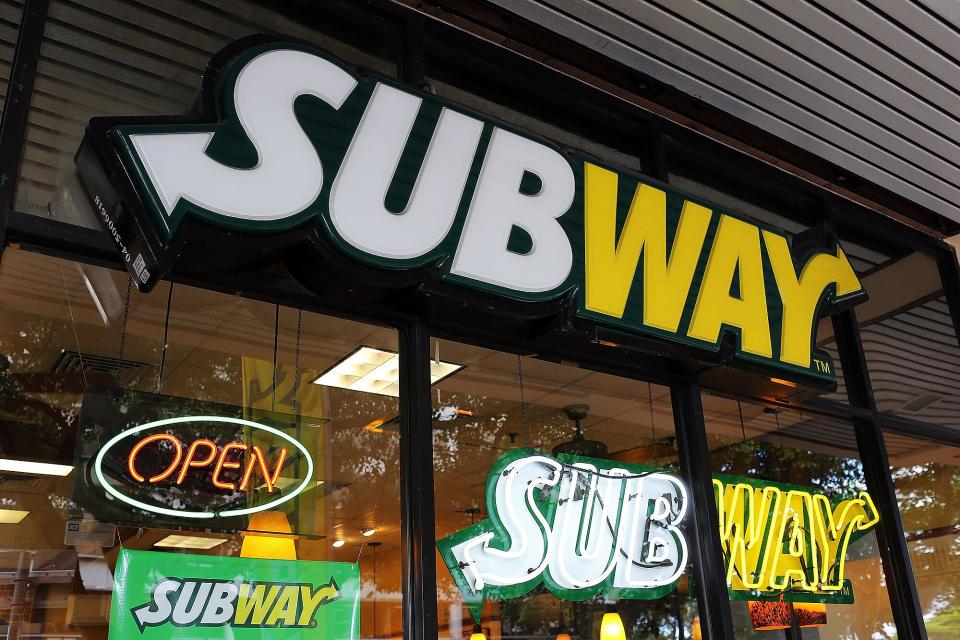Lab Study Determines There's 'No Amplifiable Tuna DNA' in Subway Tuna Sandwiches amid Lawsuit Against Chain

Jörg Carstensen/picture alliance via Getty Images Subway tuna sandwich
The Subway tuna saga continues after a lab study found no evidence of tuna DNA following testing of Subway's sandwiches and wraps.
The New York Times commissioned to have "more than 60 inches worth of Subway tuna sandwiches" tested by a lab following a lawsuit in January which claimed there's no real tuna in the chain's ingredients. The Washington Post was the first to report the allegations made by two California residents - Karen Dhanowa and Nilima Amin - who filed the lawsuit in the U.S. District Court for the Northern District of California.
Samples of the tuna from Subway were picked up from three locations in Los Angeles and a lab conducted a PCR test to determine if the chain restaurant's tuna included one of five different tuna species, the New York Times revealed. As the outlet notes, the Seafood List compiled by the U.S. Food and Drug Administration defines 15 species of fish that can be labeled as tuna.

Joe Raedle/Getty Images Subway
RELATED: Subway Calls Lawsuit Claiming There's No Real Tuna in Their Tuna Sandwiches and Wraps 'Baseless'
Subway claims that they use skipjack and yellowfin tuna, species that the lab used by the New York Times would be able to detect. "No amplifiable tuna DNA was present in the sample and so we obtained no amplification products from the DNA," the lab study concluded. "Therefore, we cannot identify the species."
The lab spokesperson added: "There's two conclusions. One, it's so heavily processed that whatever we could pull out, we couldn't make an identification. Or we got some and there's just nothing there that's tuna."
When tuna is cooked, its DNA becomes denatured - meaning that test results could be inaccurate due to the change, the New York Times added. Inside Edition similarly commissioned a lab study in February using the tuna from three Subway locations in Queens, New York. Their results concluded that the chain does use real tuna.
RELATED: Subway Fires Back at 'Absolutely False' Allegations That Their Chicken Is Fake
In the lawsuit filed in January, plaintiffs allege Subway's tuna is made "from a mixture of various concoctions that do not constitute tuna, yet have been blended together by Defendants to imitate the appearance of tuna." The complaint allegedly comes after the plaintiffs had "multiple samples" of the tuna taken from Subway locations across California tested at independent labs.
In a statement given to PEOPLE, a Subway spokesperson responded to the suit, saying: "There simply is no truth to the allegations in the complaint that was filed in California."
"Subway delivers 100% cooked tuna to its restaurants, which is mixed with mayonnaise and used in freshly made sandwiches, wraps and salads that are served to and enjoyed by our guests. The taste and quality of our tuna make it one of Subway's most popular products and these baseless accusations threaten to damage our franchisees, small business owners who work tirelessly to uphold the high standards that Subway sets for all of its products, including its tuna," the chain said. "Given the facts, the lawsuit constitutes a reckless and improper attack on Subway's brand and goodwill, and on the livelihood of its California franchisees. Indeed, there is no basis in law or fact for the plaintiffs' claims, which are frivolous and are being pursued without adequate investigation."
According to Subway's website, the tuna salad for the chain's sandwiches is made with flaked tuna in brine, mayonnaise and an additive to "protect flavor."
Never miss a story - sign up for PEOPLE's free daily newsletter to stay up-to-date on the best of what PEOPLE has to offer, from juicy celebrity news to compelling human interest stories.
The two plaintiffs are reportedly suing the sandwich chain for fraud, intentional misrepresentation, and unjust enrichment. The suit alleges that the plaintiffs were "tricked into buying food items that wholly lacked the ingredients they reasonably thought they were purchasing," court documents show. Dhanowa and Amin also claim that Subway is "saving substantial sums of money in manufacturing the products because the fabricated ingredient they use in the place of tuna costs less money," per the court documents.
Since their initial claims, the plaintiffs have changed their allegations stating their beliefs that Subway's tuna sandwiches are not 100 percent made out of tuna.
"After being presented with information from Subway, the plaintiffs abandoned their original claim that Subway's tuna product contains no tuna," a spokesperson for Subway tells PEOPLE. " However, they filed an amended complaint that now alleges our tuna is not 100% tuna and that it is not sustainably caught skipjack and yellowfin tuna."
The rep adds: Just like the original claim, the new claims have absolutely no merit. In fact, the amended complaint does not remedy any of the fundamental flaws in the plaintiffs' case and it is disappointing that they have elected to continue to pursue these baseless claims.
Throughout the years, Subway has become a common target for lawsuits, the Post noted. Back in 2013, a class-action complaint accused the chain of selling $5 foot-long sandwiches that were an inch less than the length advertised, before an appeals court later threw out a settlement in the case, describing it as "utterly worthless."

 Yahoo Finance
Yahoo Finance 